It’s celebrated like a holiday, and sometimes a boring holiday is a successful one.
For all the media buzz around the second Women’s March, I’ve mostly seen it met by shrugs in Oakland. That’s a good thing.
I don’t mean I’m gleeful that overall turnout is down. Instead, I’m glad the march has new meaning.
Last year, the march was a miracle. The inauguration of one of the world’s most powerful leaders was overshadowed by an alternate event mocking his authority. That’s big news!
A growing base has its challenges, but is the fragile Left falling apart? Hardly.
This year, the march was a holiday; special but not mind-blowing, its ordinariness is a sign of organizational health.
My mom is a pastor, so I know holidays are hard work. As soon as Christmas is over, you start preparing for Easter. A second Women’s March is impressive, especially when you remember that, like holy days, marches are not most meaningful in themselves, but as invitations.
Some people who accepted the invitation came for selfies and “The Future Is Female” consumerism; this is America, after all.
But many connected with day-to-day organizing spent the year alongside long-time activists protesting for DACA, the ACA, Black Lives, divestment, and #MeToo. They shrug because now protesting feels normal.
They shrug, but this is still a base-building moment. Sacramento’s march almost doubled in attendees this year. The #resistance is spreading. My 91-year-old grandma asked me to explain hashtags because she wants to read “all the stories those ladies are sharing.”
A growing base has its challenges. Women of color, trans women, cis white women, and hundreds of local organizations struggle to share power. But is the fragile Left falling apart? Hardly.
The Women’s March is our newest family holiday. Rather than tolerate each other from a distance, the messiness shows the Left practicing community. Sometimes, a boring holiday is a successful holiday. A big-tent gathering like the Women’s March is a like Thanksgiving dinner: both are best evaluated on a scale from “better than expected” to “no longer speaking.”
This year, we’re still speaking. That’s a good sign!
























